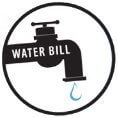by Bob Clark
If it passes in the May 20 primary election, Ballot Measure 26-156 would provide several benefits that would help slow the rate of increase in Portlanders’ water and sewer bills.
The first of these benefits would be to tame the utility license fees included in city water and sewer bills.
Mayor Charlie Hales and city Commissioner Steve Novick are seeking a new street maintenance fee, which could be as much as $144 per year per household. Other than utility bills (license fees), the Portland City Council is limited in its ability to levy such a new tax without gaining approval from voters through a referendum.
Measure 26-156 would take Portland’s existing water and sewer bureaus, and combine them into a new government entity called the Portland Public Water District. This new government entity would have its own set of elected representatives who would be focused most entirely on water and sewer service, and who would no doubt be motivated to oppose adding a street maintenance fee or other new tax onto water and sewer bills.
Voters may recall the last time water and sewer customers faced the possibility of getting tagged for a street maintenance tax was in 2008, when former city Commissioner Randy Leonard reportedly read from the Federalist Papers and argued the City Council should use its powers to increase fees embedded in utility bills. This time around, just the mere existence of the upcoming election vote on Measure 26-156 may be politically blocking the currently proposed street maintenance tax from being included in water and sewer bills.
Another benefit of Measure 26-156 for water and sewer ratepayers is it discourages the use of water and sewer funds to buy real estate that has questionable return in relation to managing water and sewer service costs. Limiting such real estate activity may reduce water and sewer costs periodically by several million dollars systemwide.
To this point and as background, city Auditor LaVonne Griffin-Valade completed an audit of the city’s water and sewer expenditures in March 2011, “Spending Utility Ratepayer Money.” On page 8 of this report, under the heading “audit results,” appears the summary: “Decisions on spending ratepayer money are not always transparent or directly linked to water and sewer services.”
Subsequent to this audit, in May 2011, the City Council approved spending $6 million in sewer operating funds to help purchase property from the River View Cemetery Association, accounting for more than 50 percent of the property’s purchase price. Although the council talked of the property’s watershed benefits in making this purchase, management of the property was expected to be transferred to the parks bureau with the intention of developing nature trails.
In March 2014, Multnomah Circuit Court Judge Stephen Bushong did rule the council had the authority to divert sewer funds to purchase this property, but mostly because the city charter’s test of reasonableness in this incidence is rather subjective in nature.
Yet one more benefit of Measure 26-156 is it may lead to a rebound in Portland’s relations with wholesale water customers.
A large part of the cost of supplying water is fixed in nature; and Portland household water bills actually decrease when Portland sells larger volumes of water to wholesale customers, like those water agencies in surrounding suburbs.
The Portland City Council may have worsened relations with wholesale customers beyond an already dissatisfied state when it decided without advance notice to fluoridate Portland’s water supply (a move subsequently stopped by Portlanders via citizen initiative in 2013). This observation comes from page 5, “Rising Rates and Customer Concerns,” City Club of Portland, March 7, 2014, report.
Wholesale water sales may be teetering on an irreversible decline. Measure 26-156 creates a water and sewer district, sporting a clean record, which might be able to encourage wholesale customers to continue apace their water purchases from Portland.
Lastly, there are prominent local institutions that acknowledge the need to fix the city’s water and sewer governance. In fact, as part of a fix, the City Club recommends the establishment of a water and sewer authority, with certain controls over it retained by the City Council.
Measure 26-156’s citizen-owned district is preferable to such an alternative, however. Measure 26-156’s district would be quite autonomous and have a singularity of focus, not one influenced by the myriad of political issues pre-occupying the City Council.
The measure’s prescribed board elections would likely encourage a keen focus on stabilizing water and sewer rates, and maintaining the quality of one of the world’s best-tasting waters.
Bob Clark of Southeast Portland has worked as a senior economist for the Oregon Public Utility Commission and as an economist for the Bonneville Power Administration. He also is a volunteer for the Taxpayers Association of Oregon.
